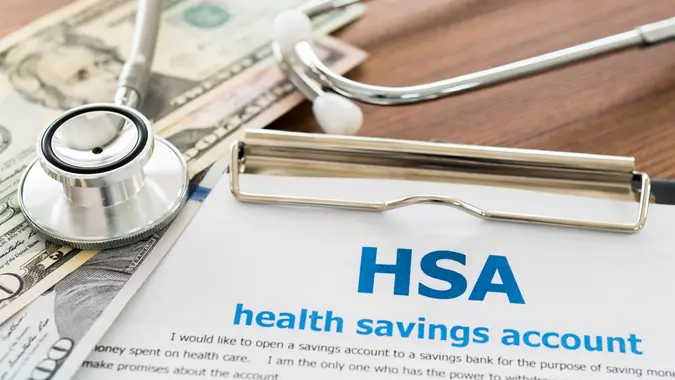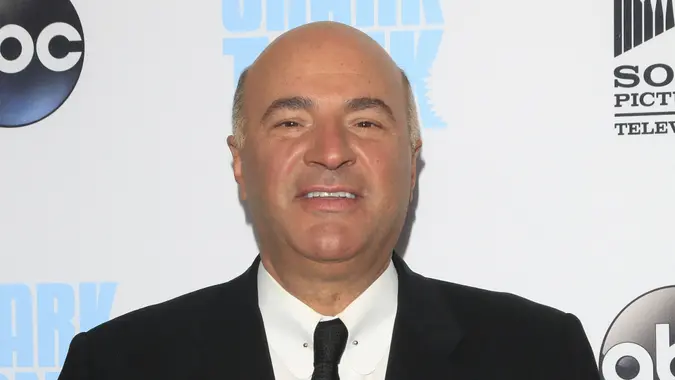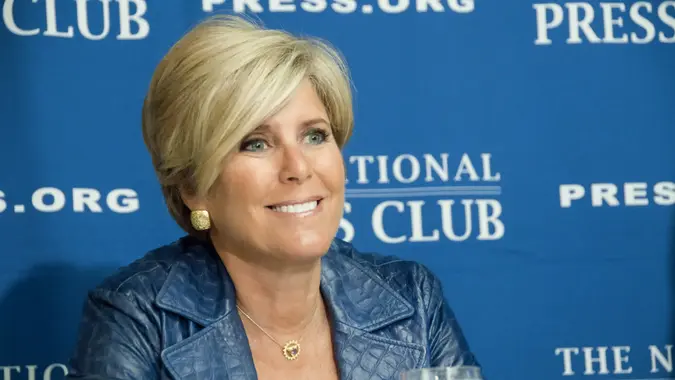I’m an Investor: I’m Making These Money Moves Immediately If Harris Wins

Commitment to Our Readers
GOBankingRates' editorial team is committed to bringing you unbiased reviews and information. We use data-driven methodologies to evaluate financial products and services - our reviews and ratings are not influenced by advertisers. You can read more about our editorial guidelines and our products and services review methodology.

20 Years
Helping You Live Richer

Reviewed
by Experts

Trusted by
Millions of Readers
America is months away from a historic election taking place and a potentially historic outcome in the process. Vice President Kamala Harris has become the lead candidate to possibly take over the Democratic ticket and become the next president of the U.S. Everyone is watching what will happen this November, including investors who are poised to take advantage of a Harris win.
“Although I don’t see material differences in broader economic growth trajectories under a Harris or Trump administration, there are several actionable opportunities investors can capitalize on should Harris take office,” said Dan Kim, investment analyst and portfolio manager at Saturna Capital.
“A Harris presidency could bring substantial shifts in economic policies and being proactive in your financial strategy is essential,” said Daniel Wood, CEO of Swedish Wealth Institute. “These moves not only position you to take advantage of new opportunities but also protect your assets against potential risks.”
Here are some testimonies from investors on what money moves they’ll be making immediately if Harris wins the upcoming election.
Energy
Wood remarked that Harris is known for her strong stance on climate change and green energy, which could be an interesting opportunity for investors to get in on if she becomes president.
“With her in office, there will likely be significant investments and subsidies in renewable energy sectors such as solar, wind and electric vehicles. Investing in companies that are leaders in these areas could yield substantial returns,” Wood said.
Cyber Security
“If Harris were to win, I would look to increase exposure in cybersecurity companies with strong zero-trust hybrid deployment capabilities and enterprise software vendors that can accelerate the migration of legacy government workflows into the cloud,” Kim explained.
“Harris has fairly consistently called out cybersecurity in both domestic and foreign policy, with an emphasis on cloud security and zero trust architecture,” he said. “It is also reasonable to assume Harris will push for stricter cybersecurity regulations across critical infrastructure such as healthcare, education and utilities.”
Taxes
“As a CPA, I would advise high net worth clients to consider accelerating income and realizing capital gains this year due to potential tax increases under a Harris administration,” said John Pace, certified public accountant (CPA) and tax manager for Pace & Associates CPAs.
Pace said, “One client’s LLC generated significant profits this year, so we worked with their accountant to accelerate invoices and collections to realize that income at current rates.”
David Brilliant, tax, trust and estate lawyer with Brillant Law said, “Take advantage of existing loopholes before any changes to the tax code. Gift assets to irrevocable trusts and grantor-retained annuity trusts to reduce estate taxes. The current $11.58 million estate tax exemption per person is likely to decrease under a Harris administration.”
“For individuals, converting traditional IRAs to Roth IRAs could be strategic if income tax rates rise,” Pace explained. “Roth IRAs provide tax-free growth and avoid RMDs. I’ve guided clients through partial Roth conversions to diversify their tax exposure.”
Healthcare
This also includes the biotech sector, which is ripe for investors to make money on, especially with Harris as commander in chief.
“Given Harris’ support for expanding healthcare access, sectors like healthcare and biotech are likely to see increased funding and innovation,” Wood explained. “Companies working on groundbreaking treatments or expanding healthcare services could experience growth, making them a smart addition to your investment portfolio.”
Education
“I would look closely at tax-advantaged accounts like 529 college savings plans and HSAs while current rules are in place. New leadership may mean new tax policies, and maximizing existing benefits is prudent,” said David Blain, chartered financial analyst (CFA) and CEO of BlueSky Wealth Advisors.
“For example, fully funding an HSA now provides tax-free growth and withdrawals for healthcare costs, a useful tool if regulations change,” Blain added.
Business
“For business owners, examine how potential policy shifts could impact operating costs, especially regarding employee benefits and wages,” Blain said.
“Changes like increased minimum wage or mandated benefits will directly hit your bottom line,” said Ben Klesinger, CEO of Reliant Insurance Group and Helping Hand Financial. “Plan ahead by forecasting new expenses and determining how to offset them. For example, improved technology or streamlined processes could help minimize the impact.”
“Develop contingency plans to offset higher expenses, whether improving technology, revising pricing or streamlining processes,” Blain added. “When costs rise, businesses must adapt quickly to stay profitable.”
Brilliant said it might be worth it to consider “selling or gifting ownership interests to limit capital gains taxes. The 20% qualified business income deduction may also go away, making pass-through entities like LLCs and partnerships less attractive.”
Fixed Income
“Consider moving cash into short-term fixed income products instead of riskier investments,” Klesinger explained. “If economic conditions slow due to policy changes, these options provide stability.”
“Fixed income, shorter-term CDs, treasuries and investment-grade bonds provide stability if economic activity slows under new leadership,” Blain said.
“While riskier holdings may suffer in the short-term, fixed income anchors a portfolio during volatility,” Blain added. “For cash needed within a few years, these options guarantee principle and modest returns regardless of market conditions.”
Insurance
“For riskier investments, review insurance safeguards in case regulations tighten,” Blain explained.
“Take advantage of current insurance products and rates before any policy changes,” Klesinger said, pointing out how long-term care and life insurance policies may offer more comprehensive coverage or lower premiums now versus if regulations are tightened
“Environmental insurance, for example, protects businesses pursuing green energy projects in the face of legal or policy changes. Life insurance and long-term care also lock in coverage at today’s rates and rules, valuable if standards evolve,” Blain said. “Protecting both personal and business assets is key.”
Cash
“Keep excess cash in short-term treasuries or high-quality bonds instead of the stock market,” Brilliant said.
“While investing in growth opportunities is crucial, maintaining a solid cash reserve is equally important,” Wood explained. “This liquidity allows for quick adjustments to your portfolio in response to market changes and ensures you are prepared for any short-term volatility.”
“Higher corporate and individual tax rates often slow economic growth and hurt stock returns. Bonds provide stability if the economy cools or the stock market drops,” Brilliant added.
Editor’s note on election coverage: GOBankingRates is nonpartisan and strives to cover all aspects of the economy objectively and present balanced reports on politically focused finance stories. For more coverage on this topic, please check out I’m Making These Money Moves Immediately If Trump Wins.
More From GOBankingRates
 Written by
Written by  Edited by
Edited by 




























